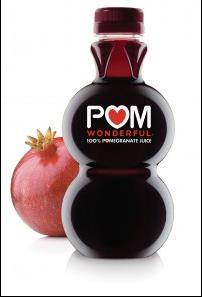 onderful v. Coca-Cola, was argued before the Supreme Court last week, and addresses whether a company can sue a competitor over what it considers to be misleading advertising, even if federal regulators have approved the labeling in question.
onderful v. Coca-Cola, was argued before the Supreme Court last week, and addresses whether a company can sue a competitor over what it considers to be misleading advertising, even if federal regulators have approved the labeling in question.Minute Maid, a subsidiary of Coca-Cola, sells a juice drink that — despite being just 0.3 percent pomegranate juice and 0.2 percent blueberry juice (the rest is apple, grape and raspberry juice) — has a label that features “Pomegranate Blueberry” prominently and “Flavored Blend of Five Juices” in smaller type size.
The Food and Drug Administration did not take issue with Coke’s labeling of the juice, but competitor Pom Wonderful — which makes more-concentrated pomegranate juice — did. It sued Coca-Cola in 2008 for false advertising.
The case is drawing attention not just from the advertising industry, but trade associations and business groups across the board — including the U.S. Chamber of Commerce, the Grocery Manufacturers Association and the Generic Pharmaceutical Association that have filed briefs with the court indicating their interest in the outcome — because of the impact it could have a broad swath of companies, the way they advertise their products and whether they can be sued by competitors if those competitors find their labeling to be misleading.
“This is a high-stakes dispute, and the implications for the advertising industry, not just food and beverages, are significant,” Jill Bollettieri, assistant general counsel at General Mills, said last week at the Association of National Advertisers’ annual law and public policy conference in Washington. “I think the entire industry will be waiting with bated breath until we get a decision in a couple months.”
The lower courts have sided with Coca-Cola, which argued that Pom’s lawsuit should not have been allowed to continue because Coca-Cola followed FDA labeling rules. If the Supreme Court rules in Coca-Cola’s favor, it could give companies that make food, beverages and other FDA-regulated products more protection against lawsuits by private parties — typically competitors — down the road, said attorney Chris Cole, head of the advertising practice at Crowell & Moring.
If Pom wins, it could open the door for more food and beverage companies to sue their competitors over advertising, even if those competitors have followed the FDA’s rules.
“A victory for Pom will be interpreted by many as a signal that this wave of litigation against food companies can continue,” Cole said.
As a result, companies will have to be even more careful when crafting labels to make sure the claims are not false or misleading, said FDA lawyer Ivan Wasserman of Manatt, Phelps & Phillips.
“Food companies are already facing an avalanche of class action lawsuits based on labeling claims,” he said. “This could increase the volume.”





